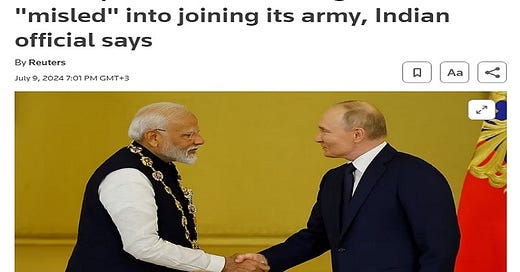India played it cool and didn’t overreact, for which it deserves a lot of credit, while Russia agreed to discharge its partner’s nationals from service even before the investigation concludes.
Indian media reported that Prime Minister Narendra Modi discussed the issue of Indians being duped by human trafficking gangs into joining the Russian Army during his informal talks with President Putin on Monday. The Russian leader allegedly promised his counterpart to discharge the several dozen Indian nationals who are reportedly operating as support staff after a few of them were killed earlier this year. Russian Charge d’Affaires in Delhi Roman Babushkin had more to say about this. In his words:
“We do not want them, and we are investigating the agents who recruited and deceived them. Agents from Russia are also under investigation. All Indian nationals in Russia are there on visitor or business visas, and we have no mechanism for recruiting Indian or other foreign nationals into our army.”
While it’s premature to know exactly how this scandal unfolded in the first place, it wouldn’t be surprising if the same speculative network that was behind the earlier controversial recruitment of Cubans and Nepalis is behind this one too. The preceding hyperlinked analyses from last year posited that remnants of now-defunct Wagner might be involved in a scheme where they collude with human traffickers and corrupt recruiters to dupe Indians into joining the army in exchange for kickbacks.
A wide-ranging anti-corruption investigation has already rocked some of the most senior levels of the Russian Defense Ministry in recent months so it should be assumed that it’ll eventually narrow in on whoever is committing these crimes as well. After all, this issue is highly problematic since Russia and India are special and privileged strategic partners, and it’s contrary to the spirit of their decades-long friendship for anyone in Russia to dupe Indians into risking – and in some cases losing – their lives.
It's therefore imperative to let the investigation run its course and justice be served by bringing the full weight of the law down upon those who could have caused major trouble in Russian-Indian relations. India trusted Russia enough though to know that something was very wrong and that this wasn’t part of its policy. It therefore refused to jump on the Russia-bashing bandwagon by spewing conspiracy theories about Russia allegedly being so low on troops that it was desperately duping Indians to join its army.
That could have led to praise in the Western media, where India is nowadays treated unfairly on the pretext of its alleged involvement in overseas assassinations, but that’s really just a cover for punishing it for refusing to dump Russia. Doing so would have ruined their ties though and risked pushing Russia further into China’s arms, after which India would feel pressured to embrace the US at the expense of its hard-earned strategic autonomy, thus heralding a Sino-US world order instead of a truly multipolar one.
The takeaway from this sensitive issue is that it failed to weaken the trust that was forged between them over the decades. India played it cool and didn’t overreact, for which it deserves a lot of credit, while Russia agreed to discharge its partner’s nationals from service even before the investigation concludes. Going forward, these two strategic partners will work more closely in combating human trafficking networks, which will further strengthen their trust unlike what their ill-wishers hoped would happen.




